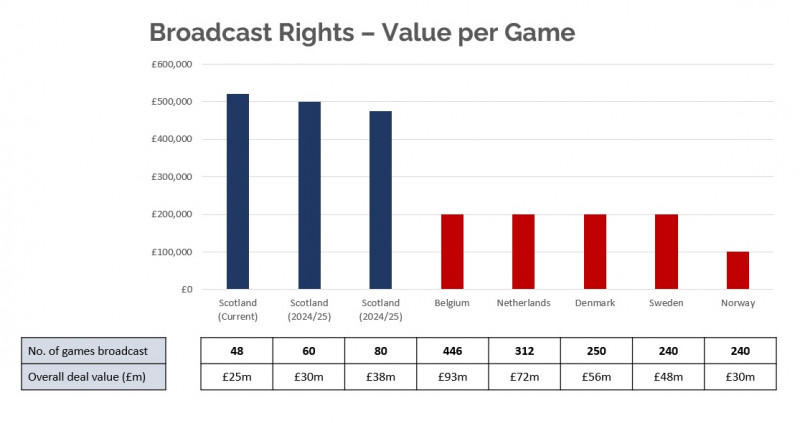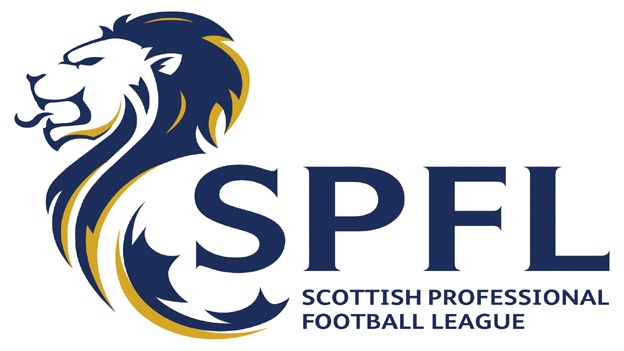Dave Cormack, chairman of Aberdeen FC comments on new SPFL broadcast deal:
Much has been written and said about the potential new deal between the SPFL and Sky.
Our game has some real challenges that we must address but the almost unilateral criticism of this potential Sky deal as soon as it was leaked, devoid of all the facts and context, doesn’t help.
It was recently reported that Sweden is getting £48 million a season versus the current SPFL deal of about £25 million.
These reports state that Malmo gets double what Rangers got for last season’s second place finish.
The reality is that Sweden has sold all 240 top league games per season to live television.
The SPFL currently sells only 48.
All of Malmo’s home games are live on television.
SPFL premiership clubs are committed to only four (soon to be five) live television games at home.
The chart below compares similar leagues to Scotland.
The SPFL’s current, proposed, and potential broadcasting deals of up to £38 million per season shows a significantly higher value per game the SPFL is getting against comparable countries.
More than double that of Holland, Belgium, Sweden, and Denmark; and in the case of Norway almost four times more.
This begs the question; would SPFL premiership clubs be willing to provide every home game live in order to get the total value of any broadcasting deal much, much higher?
The simple answer is no, most clubs don’t have the appetite to provide anything like 19 home league games live on television.
Why?
Because it would cannabalise season ticket sales, gate income, hospitality, and retail sales, never mind dramatically impacting on the atmosphere at our games.
Even if we wanted to sell every SPFL premiership game live to television, there is no broadcaster out there, given that we are in the UK and compete with the EPL and EFL, with any interest in taking more than 60-80 games per season live from the SPFL that would be willing to pay enough to outweigh the erosion of other income streams.
To balance that, Sky gets to broadcast SPFL games in England, so you’d expect the SPFL to get a fair uplift over these other countries.
We’re getting more than double the value per game than Holland; is that the right number?
Having weighed all of this up, even if the SPFL has to go out to tender for the 10 or 20 game option should Sky not take that up, almost every SPFL member club believes that Sky is the best partner and that this is a good deal that provides certainty over the medium term.
The fact that we have not gone out to formal tender does not mean that we’ve not talked to the market.
Along with my colleagues at Dundee, Dundee United, Hearts, and Hibs, over the last two years we’ve invested significant time, energy, and money, including using Deloitte, to deliver a clear commercial vison and strategy that was well received by SPFL member clubs.
This led to the SPFL forming an Innovation and Strategy Group including myself, Ron Gordon, Michael Nicholson, Stewart Robertson, and Andrew McKinlay.
In only a few months we have made decent progress, leading to the SPFL board, and in turn the executive, agreeing to develop and deliver a plan, including a set of key initiatives, to achieve the league’s aspiration of £50 million per year of distributable income to member clubs.
The onus is now on the SPFL executive to present to the Board a detailed plan, including commercial structure and income streams, with measurable objectives.
Once that plan has been developed and agreed, the SPFL should share the key pillars that will get us there, and ongoing updates on progress.
The Innovation and Strategy Group would continue to provide input, guidance, and support to the executive in pursuit of achieving these goals.
We have so much to get on with as a league.
What we need is to get this Sky deal concluded and to get the never-ending cinch dispute behind us.
We can then focus all our energies tackling the other critical issues and opportunities we face to improve our game and income.
From my perspective we’re just kicking off.
Let’s see where these initiatives to grow our income take us before we give ten reasons why every single initiative won’t work.




